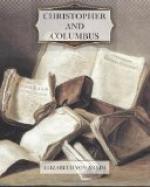“There’s our luggage,” said Anna-Rose, turning to Mr. Sack on getting inside the room, her voice gone a little shrill in her determined cheerfulness. “Can it be brought up?”
“Luggage?” repeated Mr. Sack, putting his hand to his forehead. “Excuse me, but I’ve got such a racking headache to-day—it makes me stupid—”
“Oh, I’m very sorry,” said Anna-Rose solicitously.
“And so am I—very,” said Anna-Felicitas, equally solicitous. “Have you tried aspirin? Sometimes some simple remedy like that—”
“Oh thank you—it’s good of you, it’s good of you. The effect, you see, is that I can’t think very clearly. But do tell me—why luggage? Luggage—luggage. You mean, I suppose, baggage.”
“Why luggage?” asked Anna-Rose nervously. “Isn’t there—isn’t there always luggage in America too when people come to stay with one?”
“You’ve come to stay with me,” said Mr. Sack, putting his hand to his forehead again.
“You see,” said Anna-Felicitas, “we’re the Twinklers.”
“Yes, yes—I know. You’ve told me that.”
“So naturally we’ve come.”
“But is it natural?” asked Mr. Sack, looking at them distractedly.
“We sent you a telegram,” said Anna-Rose, “or rather one to Mrs. Sack, which is the same thing—”
“It isn’t, it isn’t,” said the distressed Mr. Sack. “I wish it were. It ought to be. Mrs. Sack isn’t here—”
“Yes—we’re very sorry to have missed her. Did she go to meet us in New York, or where?”
“Mrs. Sack didn’t go to meet you. She’s—gone.”
“Gone where?”
“Oh,” cried Mr. Sack, “somewhere else, but not to meet you. Oh,” he went on after a moment in which, while the twins gazed at him, he fought with and overcame emotion, “when I heard you speaking in the hall I thought—I had a moment’s hope—for a minute I believed—she had come back. So I went out. Else I couldn’t have seen you. I’m not fit to see strangers—”
The things Mr. Sack said, and his fluttering, unhappy voice, were so much at variance with the stern lines of his Gibson profile that the twins viewed him with the utmost surprise. They came to no conclusion and passed no judgment because they didn’t know but what if one was an American one naturally behaved like that.
“I don’t think,” said Anna-Felicitas gently, “that you can call us strangers. We’re the Twinklers.”
“Yes, yes—I know—you keep on telling me that,” said Mr. Sack. “But I can’t call to mind—”
“Don’t you remember all Uncle Arthur’s letters about us? We’re the nieces he asked you to be kind to for a bit—as I’m sure,” Anna-Felicitas added politely, “you’re admirably adapted for being.”
Mr. Sack turned his bewildered eyes on to her. “Oh, aren’t you a pretty girl,” he said, in the same distressed voice.
“You mustn’t make her vain,” said Anna-Rose, trying not to smile all over her face, while Anna-Felicitas remained as manifestly unvain as a person intent on something else would be.




